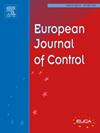Prescribed exponential stabilization of scalar neutral differential equations: Application to neural control
IF 2.5
3区 计算机科学
Q2 AUTOMATION & CONTROL SYSTEMS
引用次数: 0
Abstract
This paper presents a control-oriented delay-based modeling approach for the exponential stabilization of a scalar neutral functional differential equation, which is then applied to the local exponential stabilization of a one-layer neural network of Hopfield type with delayed feedback. The proposed approach utilizes a recently developed partial pole placement method for linear functional differential equations, leveraging the coexistence of real spectral values to explicitly prescribe the exponential decay of the closed-loop solution. While a delayed proportional (P) feedback control may achieve stabilization, it requires higher gains and only allows for a shorter maximum delay compared to the proportional-derivative (PD) feedback control presented in this work. The framework provides a practical illustration of the stabilization strategy, improving upon previous literature results that characterize the solution’s exponential decay for simple real spectral values. This approach enhances neural stability in cases where the inherent dynamics are stable and offers a method to achieve local exponential stabilization with a prescribed decay rate when the inherent dynamics are unstable.
标量中立型微分方程的规定指数镇定:在神经控制中的应用
本文提出了一种基于控制的中立型标量泛函微分方程指数镇定的建模方法,并将其应用于具有延迟反馈的Hopfield型单层神经网络的局部指数镇定。提出的方法利用最近开发的线性泛函微分方程的部分极点放置方法,利用实谱值的共存来明确规定闭环解的指数衰减。虽然延迟比例(P)反馈控制可以实现稳定,但与本工作中提出的比例导数(PD)反馈控制相比,它需要更高的增益,并且只允许更短的最大延迟。该框架提供了稳定策略的实际说明,改进了以前的文献结果,这些结果表征了简单真实光谱值的解的指数衰减。该方法在固有动态稳定的情况下增强了神经系统的稳定性,并在固有动态不稳定的情况下提供了一种以规定衰减率实现局部指数稳定的方法。
本文章由计算机程序翻译,如有差异,请以英文原文为准。
求助全文
约1分钟内获得全文
求助全文
来源期刊

European Journal of Control
工程技术-自动化与控制系统
CiteScore
5.80
自引率
5.90%
发文量
131
审稿时长
1 months
期刊介绍:
The European Control Association (EUCA) has among its objectives to promote the development of the discipline. Apart from the European Control Conferences, the European Journal of Control is the Association''s main channel for the dissemination of important contributions in the field.
The aim of the Journal is to publish high quality papers on the theory and practice of control and systems engineering.
The scope of the Journal will be wide and cover all aspects of the discipline including methodologies, techniques and applications.
Research in control and systems engineering is necessary to develop new concepts and tools which enhance our understanding and improve our ability to design and implement high performance control systems. Submitted papers should stress the practical motivations and relevance of their results.
The design and implementation of a successful control system requires the use of a range of techniques:
Modelling
Robustness Analysis
Identification
Optimization
Control Law Design
Numerical analysis
Fault Detection, and so on.
 求助内容:
求助内容: 应助结果提醒方式:
应助结果提醒方式:


